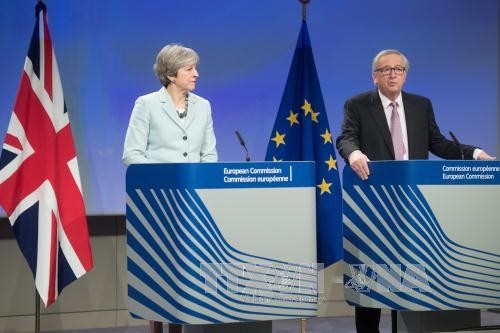Brexit negotiations to move to next phase
Hong Van -
(VOVWORLD) - At their year-end summit on Thursday, leaders of 27 EU countries are expected to approve the agreement that the EU and UK signed last week. Once approved, the agreement will enable both sides to move to the next phase of negotiation. The EU is expected to release a draft of the Brexit Treaty early next year.
 UK Prime Minister Theresa May and EC President Jean-Claude Juncker at a press conference in Brussels UK Prime Minister Theresa May and EC President Jean-Claude Juncker at a press conference in Brussels |
Under the EU’s 1973 Lisbon Treaty, it will take the UK two years to settle its divorce from the EU. Over the past few months, the two sides have held several negotiations but failed to reach consensus.
Sufficient progress made
EU and UK officials say they have made remarkable progress that creates a prerequisite for a discussion of future bilateral ties.
They reached consensus on the rights of the 3 million European citizens living in the UK, the rights of British citizens living in European countries, the border between the Republic of Ireland and Northern Ireland, and the UK’s financial obligations.
The UK agreed to recognize the authority of the European Justice Court in a number of legal cases that relate to the interests of the 3 million European citizens living and working in the UK. The UK promised no hard border in Ireland, a sticky issue in previous Brexit negotiations. Because Northern Ireland is part of the UK, it will use tariffs and market management rules of the UK post-Brexit. This has worried the Republic of Ireland because a hard border would affect the Belfast Peace Agreement signed in 1998, as well as cross-border trade. The UK agreed to pay the EU from 47 to 52 billion USD.
One day prior to the summit, the European Parliament urged EU leaders to give a “green light” to the next phase. Michel Barnier, Head of the EU’s Brexit negotiation delegation, said the recent progress will be turned into a legally binding deal. Future Brexit negotiations will focus on creating a short and defined transitional period and defining future bilateral ties.
Next phase of negotiations
Before the summit, British Brexit Minister David Davis pledged that the Government will not pay a penny of the agreed Brexit bill if no future trade deal with the EU is agreed by March, 2019. Though Davis said it was simply a "statement of intent" and was not "legally enforceable", his statement stirred up strong reaction among EU officials. Mr. Barnier rejected the statement and reiterated the EU's official line that only a "political declaration" outlining future trade relations would be ready at the time of Britain's withdrawal.
On Wednesday, British lawmakers suspended Prime Minister Theresa May's Brexit plans by giving Parliament the final say on any exit agreement the government reaches with the European Union.
Britain is due to leave the bloc in March 2019, but a Brexit deal will have to be agreed to by the fall of 2018 to give national parliaments time to approve it. Though sufficient progress has been achieved, the next phase of the process will be tough.
Hong Van